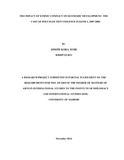| dc.description.abstract | Ethnic diversity is one of the greatest pillars of any society world-wide. The
variety and competition that comes with it is good for social-economic growth. However,
ethnic groups’ interests and completion for scarce resources among the different groups
brings about ethnic polarization.
Most countries especially in Africa have experienced a form of conflict that has
an ethnic relation. These wars take an ethnic perspective even when the real cause could
be land/natural resources, politics, discrimination or unequal distribution of resources.
Ethnic conflicts have caused a lot of destruction in many great nations. This research
shows that the destruction of property, mistrust, apathy, and killings that comes with
ethnic polarity reduces the GDP of nations across the globe.
This study shows the impact of ethnic related conflicts to the economic growth
and development of Kenya with a particular analysis of the post-election violence in
Kenya that happened between December 2007 and February 2008. This particular
warfare had a great effect on the Kenyan economy more than any other catastrophe in the
history of the country. The aftermath of this PEV continues to bite to-date and therefore
structures and policies have to be put in place in countries with potential of this conflict
in order to immunize national economy from annihilation. | en_US |

